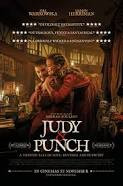
Directed by
Mirrah Foulkes
105 minutes
Rated MA
Reviewed by
Bernard Hemingway

Judy & Punch
Synopsis: Judy (Mia Wasikowska) and her husband Punch (Damon Herriman) eke out a living with their two-person puppet show in the 17th century village of Seaside, somewhere in England but nowhere near the sea.
Actor turned writer-director Mirrah Foulkes’s feature film is both an accomplished debut and an over-wrought feminist diatribe. An imaginative origin story for the iconic British Punch and Judy puppet show it takes the notoriously violent and misogynistic children’s entertainment and explores the boundaries between reality and representation.
According to Foulkes the original Punch was a talented but shiftless, philandering drunkard of a puppeteer in Shakespearean England and Judy his loyal wife and mother of their sole child. When we pick up their story they are on their druthers in Judy’s childhood village. Punch believes that talent scouts will soon want them for the big time in the city of London but to bolster his fantasy he keeps hitting the bottle and worryingly, Judy. It’s a reasonable enough surmisal and Foulkes deftly works into her film the other elements of the Punch and Judy show - a dog that steals the sausages that Punch loves; a hapless policeman who is smitten with Judy, along with cameos from a crocodile and the Devil. The new spin she puts on this material is that the village is in the grip of a Salem-like witch hunt.
The film looks good and although shot in rural Victoria, with excellent production values and fine digital cinematography by Stefan Duscio, as a simulacrum for Elizabethan England it is intriguingly impressive. Had Foulkes played it as a straight costume dramedy it might have been more effective but instead she chooses to foreground her film’s allegorical meaning with a heavy-hand – the opening puppet show is accompanied by club music, Leonard Cohen's "Who By Fire” gets a guernsey, London is called “The Big Smoke”, the baby sails out the window as if it were shot out of a canon, the crowd scenes are multicultural, Tom Budge plays the wheedling village burgher like he was in a pantomime – and so on. Clearly, the message is, this is our own times garbed in fustian. Judy, of course, is the really talented one of the puppeteering couple. Add to this a “heretics camp”, a kind of sisterhood of misfits and outcasts and a symbolic (but gruesome) castration and we have a full blown moral tract.
Wasikowska’s Judy is fine albeit incongruously willowy and golden-tressed (Lucy Velick, as a buxom wench rings truer although her acting is not as good), and there are far too many Monty Pythonesque crowd scenes with extras dressed as scrofulous yokels trying to look natural but appearing anything but. Damon Herriman however steals the show as the charming but spineless Punch and Australian screen veteran Terry Norris makes a winning appearance as his demented servant.
Watching Judy & Punch I was reminded of another impressive Australian debut, Jennifer Kent's The Babadook (2004), There is a similarity of tone, a sense of looming threat that perhaps stems from our broader historically-grounded Antipodean alienation and that results in so many of our best films being the dark ones.
Had Foulkes played to this tendency and left her message to take care of itself (the final credits over a group of captivated children in the 1960s watching a Punch and Judy show does that well-enough) it might have been a quirky gem. As it is, it comes across as an at-times gifted harangue.

Want more about this film?


Want something different?




